 Looking for somewhere to live, do business, vacation, film, invest, or study? A region with POEMs (Public Official E-Markets) would score highly.
Looking for somewhere to live, do business, vacation, film, invest, or study? A region with POEMs (Public Official E-Markets) would score highly.
1) E-COMMERCE: Finally unleashed
Bill Gates prophesied “Friction Free Capitalism” in 1996. To see the reality since, it’s worth getting microscopic. Consider peer-to-peer car rental in London, UK. Whipcar started it in 2010 with £1m investment before entering the populous e-commerce graveyard in 2013. RideLink came and went in 2017. EasyCar (2014-2018) then squandered $104m internationally.
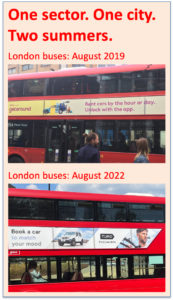 By 2019, Getaround had raised $300m to acquire Drivy, a further $150m started saturation advertising in London before a merger. Turo totalled that with $502m worldwide. A little of this goes on software development, most enables an arms race of spending on customer acquisition in a market with no concentration of buyers or sellers.
By 2019, Getaround had raised $300m to acquire Drivy, a further $150m started saturation advertising in London before a merger. Turo totalled that with $502m worldwide. A little of this goes on software development, most enables an arms race of spending on customer acquisition in a market with no concentration of buyers or sellers.
Venture capitalists will see this battle they enable as vibrant. Someone just seeking to monetize their hatchback must absorb up to 40% deducted from any earnings (this includes standard insurance) plus burdens such as understanding disparate T&C’s – each with a likely bias to buyers, risks of transaction failure, then potentially juggle incompatible accounts to maximize opportunity. And that’s assuming Karshare or Hiya Car don’t outgrow the current big players. While this attrition rages, blunders by platform companies can further inflate costs to be recouped from users.
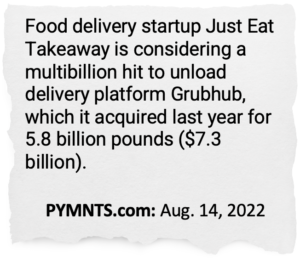 This friction-fat scenario illuminates one market. Truly unlocking platforms’ potential across the micro-economy requires thousands of such sectors, each is currently restrained by similar costs and instability. Like other technologies that transitioned from cycles of attrition to officially-enabled potential, a region with POEMs will have moved on to developing the deep benefits of new markets. Public utilities have only minor customer acquisition costs, POEMs spreads those – and software – over so many sectors.
This friction-fat scenario illuminates one market. Truly unlocking platforms’ potential across the micro-economy requires thousands of such sectors, each is currently restrained by similar costs and instability. Like other technologies that transitioned from cycles of attrition to officially-enabled potential, a region with POEMs will have moved on to developing the deep benefits of new markets. Public utilities have only minor customer acquisition costs, POEMs spreads those – and software – over so many sectors.
2) INVESTMENT: Data attraction
Territories without POEMs will wait for Amazon to install lockers for drop-offs, Uber to aggregate transport, delivery apps to expand markets for local eateries, and so on. Any jurisdiction with POEMs would allow its locals to deliver whatever services they wish more efficiently than the Silicon Valley monoliths. This diversity of offerings would be instantly visible, insured, and ready for assembly into tailored packages for visitors with a few clicks.
 So – for example – a foreign kayaker and her family seeking kit rental, local guiding, luggage transport, and accommodation along a route can assemble everything solidly in minutes. Perhaps their eldest is more engaged by local history tours, vintage car hire, or skydiving? Does their teen need slots in day camps? It can all just be added to a package for POEMs to swiftly pull together. Marshalling such diversified resources in a non-POEMs territory could take days.
So – for example – a foreign kayaker and her family seeking kit rental, local guiding, luggage transport, and accommodation along a route can assemble everything solidly in minutes. Perhaps their eldest is more engaged by local history tours, vintage car hire, or skydiving? Does their teen need slots in day camps? It can all just be added to a package for POEMs to swiftly pull together. Marshalling such diversified resources in a non-POEMs territory could take days.
 Similarly, managers charged with siting an industrial optics factory anywhere in the US might invite bids from competing regions. Non-POEMs areas must vie to undercut each other with tax hand-backs. The POEMs region’s team might just identify a city then send a link to today’s data on time-available-for-rent in existing facilities. A second link might display utilization (ratio of hours offered to hours sold) of lens technicians, milling machinery rental, and space in specialist distribution chains.
Similarly, managers charged with siting an industrial optics factory anywhere in the US might invite bids from competing regions. Non-POEMs areas must vie to undercut each other with tax hand-backs. The POEMs region’s team might just identify a city then send a link to today’s data on time-available-for-rent in existing facilities. A second link might display utilization (ratio of hours offered to hours sold) of lens technicians, milling machinery rental, and space in specialist distribution chains.
Team-POEMs would also likely use system dashboards to prove investors are poised to start up-skilling provenly reliable workers as soon as an intent to site in their region was announced.
3) JOBS: Protection, pathways, possibilities
 POEMs offers infrastructure for an age of irregularity. It broadly assumes a world of flexible people and small businesses, earning from multiple sources.
POEMs offers infrastructure for an age of irregularity. It broadly assumes a world of flexible people and small businesses, earning from multiple sources.
Does that mean anywhere with POEMs would see traditional jobs decline followed by economic instability? It may seem that way, but nuances include:
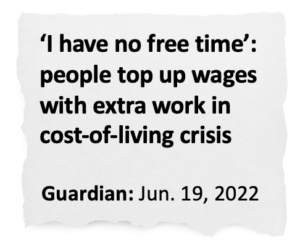 Jobs have evolved: For the lower-skilled, chances of regular hours with benefits and promotion prospects are diminishing rapidly in developed economies. Elsewhere, informal work has long been the norm. Official data don’t fully capture this, but not supporting those in uncertain work for fear of impact on jobs might be separating two concepts that could increasingly be paired.
Jobs have evolved: For the lower-skilled, chances of regular hours with benefits and promotion prospects are diminishing rapidly in developed economies. Elsewhere, informal work has long been the norm. Official data don’t fully capture this, but not supporting those in uncertain work for fear of impact on jobs might be separating two concepts that could increasingly be paired.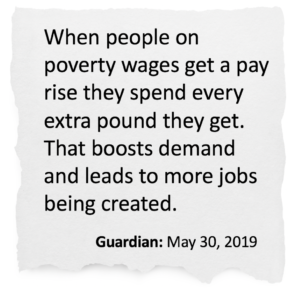 Necessity of irregular earnings: Around 35% of American adults were reliant on at least some ad-hoc work even in 2019. Day-to-day fluctuations in a medical issue, variable childcare or other family caring, studying, partial employment they wished to retain, or lack of openings prohibited hours of work dictated by an employer. Connecting these people, in often already marginalized communities, to opportunity is vital to a growing economy that adds jobs.
Necessity of irregular earnings: Around 35% of American adults were reliant on at least some ad-hoc work even in 2019. Day-to-day fluctuations in a medical issue, variable childcare or other family caring, studying, partial employment they wished to retain, or lack of openings prohibited hours of work dictated by an employer. Connecting these people, in often already marginalized communities, to opportunity is vital to a growing economy that adds jobs.- Flexi-curity: It’s counter-intuitive but many, particularly the young, see single-skill dependency on one organization (a traditional job), as inferior to a portfolio of employers, abilities, and networks. Depth of experience future-proofs. Even those hankering for regularity would benefit from real-time insights into their earnings potential as an irregular when it comes to negotiating a raise.
But, for all sorts of reasons, job creation may need to be built into POEMs. The legislation could mandate:
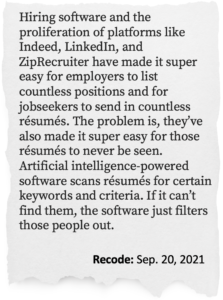 Worker flagging: Anyone working fluidly as a stopgap can mark themselves as seeking full-time in POEMs. That might allow their track record of reliability and experience to become searchable by anyone seeking interview candidates. Interview offers can be proactively pushed to targeted individuals. Instead of the vagaries of recruitment and interviewing, there’s verifiable data pinpointing local, reliable, appropriately skilled, instantly contactable, job-seekers.
Worker flagging: Anyone working fluidly as a stopgap can mark themselves as seeking full-time in POEMs. That might allow their track record of reliability and experience to become searchable by anyone seeking interview candidates. Interview offers can be proactively pushed to targeted individuals. Instead of the vagaries of recruitment and interviewing, there’s verifiable data pinpointing local, reliable, appropriately skilled, instantly contactable, job-seekers.- Targets: The system charges a flat fee on any transaction, a proportion of that goes directly to the operators. That amount can be tweaked to, for example, reward attainment of targets for workers being hired full time through the platform.
- Stability tracking: Among POEMs’ countless dashboards of data, there could be tools specifically identifying long-running bookings of workers and the skills involved. This gives government employment services early warning of need for full timers, not job creation statistics with a lag of months. Training budgets can focus in anticipation.
Any economy needs a foundation of regular workers. Allowing them to be effortlessly, precisely, topped up, substituted when absent, or replaced on retirement from an equally supported fluid workforce should boost job-creating businesses.
4) PRODUCTIVITY: Assets optimized
POEMs could drive productivity-enhancing trends through a regional economy:
 Efficient allocation: Skills gaps would be identifiable in advance through POEMs’ data. (“What is the utilization rate of accredited cellphone repairers next week?”) Individuals would have click-now access to training, possibly auto-scheduled around paid work. Likewise, the invisible hand in well-informed markets should push premises, equipment, and other resources to their most productive application.
Efficient allocation: Skills gaps would be identifiable in advance through POEMs’ data. (“What is the utilization rate of accredited cellphone repairers next week?”) Individuals would have click-now access to training, possibly auto-scheduled around paid work. Likewise, the invisible hand in well-informed markets should push premises, equipment, and other resources to their most productive application.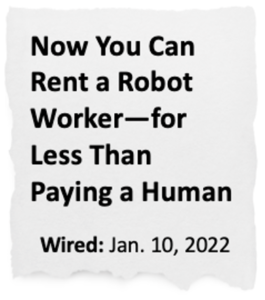 Policy possibilities: An industrial strategy? Initiatives to bring returning-mothers into the workforce? Spreading work around as automation throttles jobs? All easy to instigate, target, and fine-tune, in the precise economy that POEMs undergirds.
Policy possibilities: An industrial strategy? Initiatives to bring returning-mothers into the workforce? Spreading work around as automation throttles jobs? All easy to instigate, target, and fine-tune, in the precise economy that POEMs undergirds.- Maximized hours: Efficient markets should pump increased hours of work to the existing population. Regions now reliant on temporary incomers could find citizens selling more hours as it is so easy and informed to do so. With human capital attracting financial capital, that’s a quality workforce.
- Everyday entrepreneurs: POEMs breeds a “Just Try It” economy. Anyone can interrogate system data, spot openings, and trial a service, with no market entry costs. There’s a safety net of multiple ways of earning if any venture doesn’t work out. Education is on-going, adaptive, verifiable. Public markets should increase vital digital skills because the platform offers so much opportunity to users. Interventions to support the struggling are granular, perhaps triggered automatically.
5) COHESION: Platform Pride
 POEMs pushes local people together, unintermediated by the business priorities of global brands. A world of localized interactions with individuals retaining almost all their earnings, supported, free to innovate, and able to cultivate regular customers or employers – any of which can develop into an off-platform relationship – is likely to see diminished alienation. Each person will have a tangible stake in their local economy.
POEMs pushes local people together, unintermediated by the business priorities of global brands. A world of localized interactions with individuals retaining almost all their earnings, supported, free to innovate, and able to cultivate regular customers or employers – any of which can develop into an off-platform relationship – is likely to see diminished alienation. Each person will have a tangible stake in their local economy.
This could reach through barriers like urban “enclave economies”; geographic clusters of businesses united by ethnicity. A man may chose to remain working as, for example, a kitchen porter in Chinese restaurants; but if he does so through POEMs and keeps his system settings open, the wider world could soon start offering to upskill and widen his options.
 By empowering people who earn fluidly, POEMs should benefit all workers, just as unionization is reported to lift even those who aren’t members. Unchallenged, for-profit hourly labor markets commoditize and devalue workers, which drives down the value of all labor. POEMs reverses the commoditization. There will still be minimum-wage workers, but they will be on a ladder and the willing ones should move up more quickly.
By empowering people who earn fluidly, POEMs should benefit all workers, just as unionization is reported to lift even those who aren’t members. Unchallenged, for-profit hourly labor markets commoditize and devalue workers, which drives down the value of all labor. POEMs reverses the commoditization. There will still be minimum-wage workers, but they will be on a ladder and the willing ones should move up more quickly.
POEMs would be funded and run by multinationals, because few other entities have the resources and robustness required. But each market within it should be run by a responsive local franchisee. It’s hard to quantify, but the new facility might then engender regional pride. Contrast, for example, anti-Uber stickers around San Fransisco, their launch city, with Brits’ sustained enthusiasm for their National Health Service.
→ About: Three Decades of Preparation
